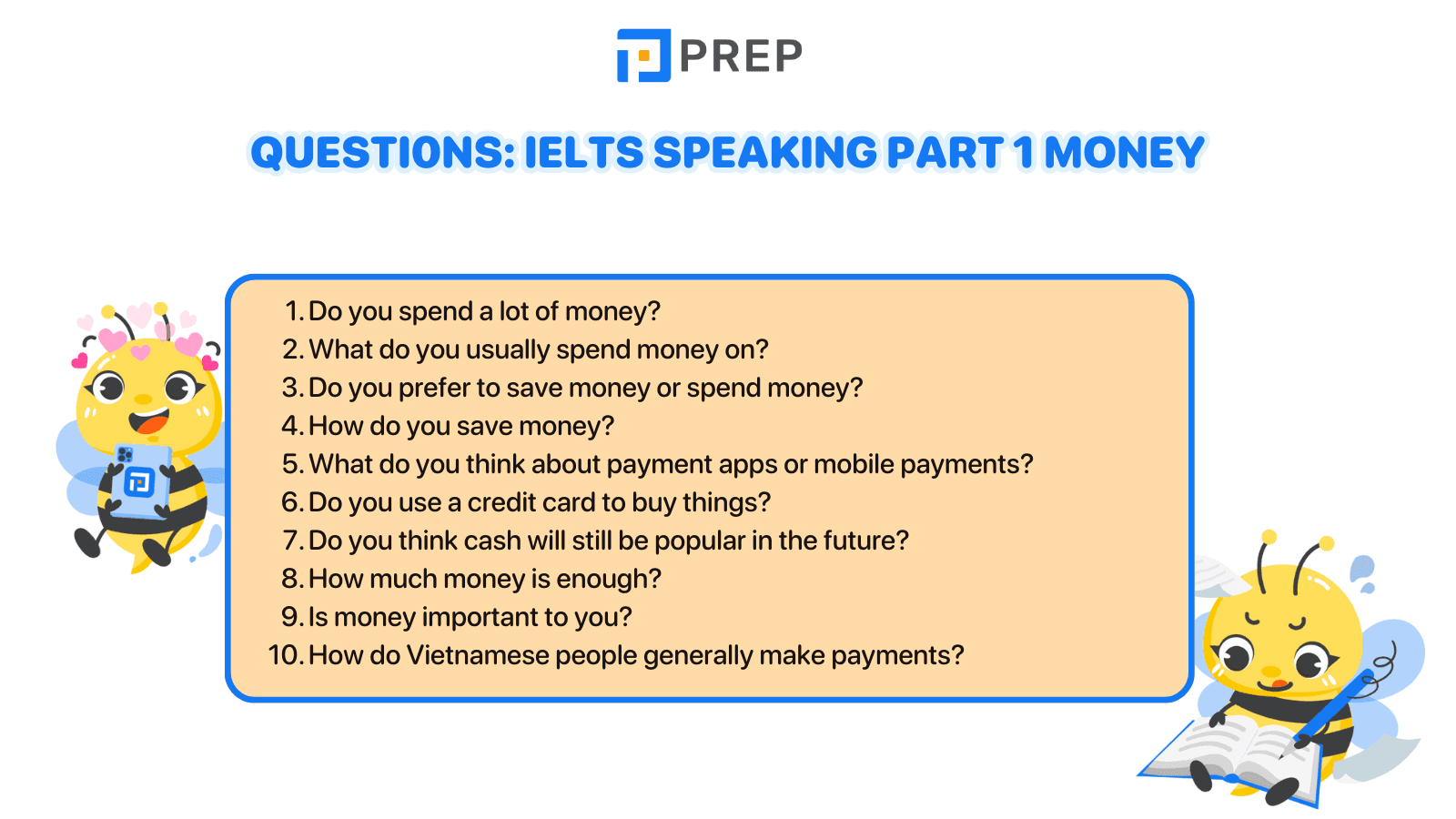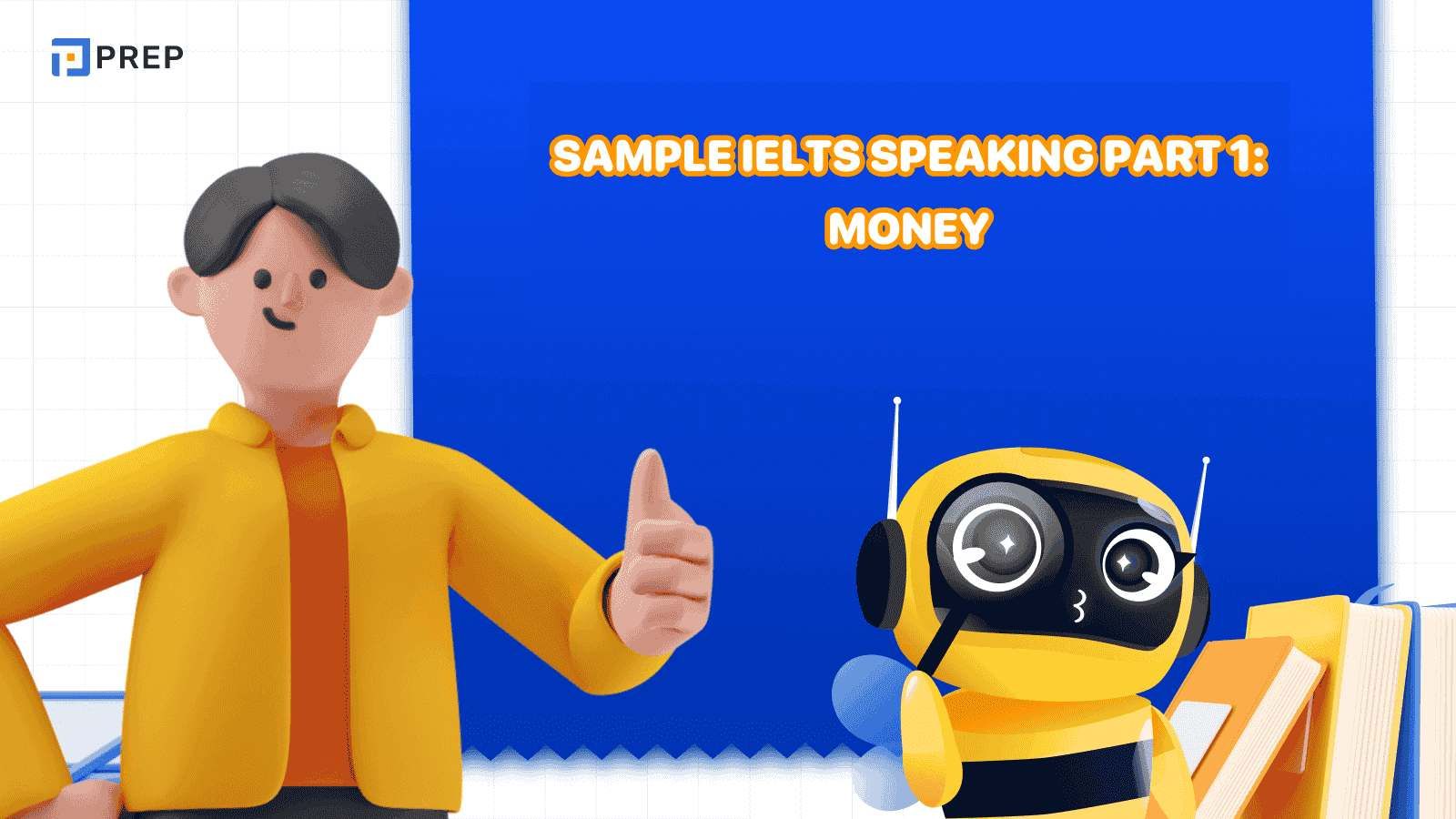IELTS Speaking Part 1: Money
Money is a familiar topic in the IELTS Speaking Part 1 exam. Have you practiced answering the frequently used questions that examiners use to assess candidates' Speaking skills? If not, let's refer to the article below to learn about ideas, vocabulary, and sample IELTS Speaking Part 1 Money at Band 7.0+ compiled by top-notch teachers.
*This sample was prepared by Mr. Nhat Pham, an IELTS 8.5 Overall achiever (9.0 Listening, 9.0 Reading, 8.0 Writing, 7.5 Speaking) and Marker Leader at PREP.

I. Sample questions IELTS Speaking Part 1 Money
PREP has collected and compiled some sample questions IELTS Speaking Part 1 Money from actual IELTS exams, please take a look!

-
Do you spend a lot of money?
-
What do you usually spend money on?
-
Do you prefer to save money or spend money?
-
How do you save money?
-
What do you think about payment apps or mobile payments?
-
Do you use a credit card to buy things?
-
Do you think cash will still be popular in the future?
-
How much money is enough?
-
Is money important to you?
-
How do Vietnamese people generally make payments?
II. Sample IELTS Speaking Part 1 Money
How can you ace the score when the examiner asks questions on Money IELTS Speaking Part 1? Let’s take a look at the sample IELTS Speaking Part 1 Money below. Please refer to them!

1. Do you prefer to save money or spend money?
I guess as much I want to splurge and buy anything I desire, from my experiences now I lean towards saving money and valuing financial stability. It provides a safety net for unforeseen circumstances and allows for future investments or experiences.
Vocabulary that scores points in the sample answers for the IELTS Speaking Part 1 Money:
-
Splurge(n):An extravagant and indulgent expenditure of money
-
Financial stability(n):The state of being financially secure and solvent
-
Unforeseen circumstances(n):Unexpected or unpredictable situations or events
2. How do you save money?
Saving money involves budgeting and being mindful of expenses. I prioritize needs over wants and set aside a portion of my income for savings. After receiving my monthly salary, I would save a third of this amount in my savings account in the bank, so I cannot touch it and make any impulsive purchases.
Vocabulary that scores points in the sample answers for the IELTS Speaking Part 1 Money:
-
Budgeting(n):The process of planning how to spend and save money.
-
Expenses(n):The cost or outlay of money to purchase or obtain something.
-
Prioritize(v):To organize or deal with things in order of importance.
-
Income(n):The money that a person or organization receives, usually on a regular basis.
-
Savingaccount(n):A bank account that pays interest and allows deposits and withdrawals.
-
Impulsive purchases(n):Unplanned or spontaneous purchases made without much consideration.
3. What do you think about payment apps or mobile payments?
Oh yes, it is very popular in Vietnam now. Payment apps and mobile payments are incredibly convenient. They streamline transactions, saving time and offering a secure alternative to traditional methods. Also, it helps me to reduce the chances of being robbed if carrying too much cash with me.
Vocabulary that scores points in the sample answers for the IELTS Speaking Part 1 Money:
-
Payment app(n):A mobile or digital application used to make financial transactions.
-
Convenient(adj):Easy to use, access, or achieve; fitting in well with a person's needs.
-
Transaction(n):An instance of buying or selling something or the movement of money.
-
Alternative(adj):Available as another possibility or choice.
-
Rob(v):To take something illegally from a person or place.
4. Do you use a credit card to buy things?
Yes, I use a credit card for purchases. It helps build a credit history and provides additional security and perks, but I'm cautious to avoid unnecessary debt.
Vocabulary that scores points in the sample answers for the IELTS Speaking Part 1 Money:
-
Purchases(n):The act of buying goods or services.
-
Security(n):The state of being or feeling safe and protected.
-
Perks(n):Advantages, benefits, or privileges beyond basic salary.
-
Cautious(adj):Showing care and thought for the consequences of one's actions.
-
Avoid(v):To keep away from or not to do something.
-
Debt(n):Something, typically money, that is owed or due.
5. Do you think cash will still be popular in the future?
While digital payments are rising, I believe cash will remain relevant for certain transactions and in specific regions where digital infrastructure may be limited. The coexistence of cash and digital currency seems likely in the future.
Vocabulary that scores points in the sample answers for the IELTS Speaking Part 1 Money:
-
Digital payment(n):The transfer of funds using digital technologies.
-
Digital infrastructure(n):The basic digital systems and services that a country or organization uses.
-
Coexistence(n):The state of existing together or at the same time.
Hopefully, after reading this article, you have mastered the questions, sample answers, and useful vocabulary for IELTS Speaking Part 1 Money. Wishing you effective IELTS Speaking practice at home and the achievement of your target score in the near future!
In PREP's IELTS Speaking course, you'll receive comprehensive pronunciation training, supported by advanced AI technology that evaluates your pronunciation exercises and provides detailed corrections. The highlight is access to the premium Prep AI Virtual Speaking Room, where you can build confidence and reflexes for real test scenarios while receiving swift, detailed feedback with 95% accuracy compared to actual exams.
Download the PREP app to study IELTS effectively at home with a high-quality online learning program designed to help you achieve outstanding scores.

Hi I'm Chloe, and I am currently serving as an Product Content Administrator at Prep Education. With over five years of experience in independent online IELTS study and exam preparation, I am confident in my ability to support learners in achieving their highest possible scores.
Comment
Premium content
View allPersonalized roadmap
Most read












